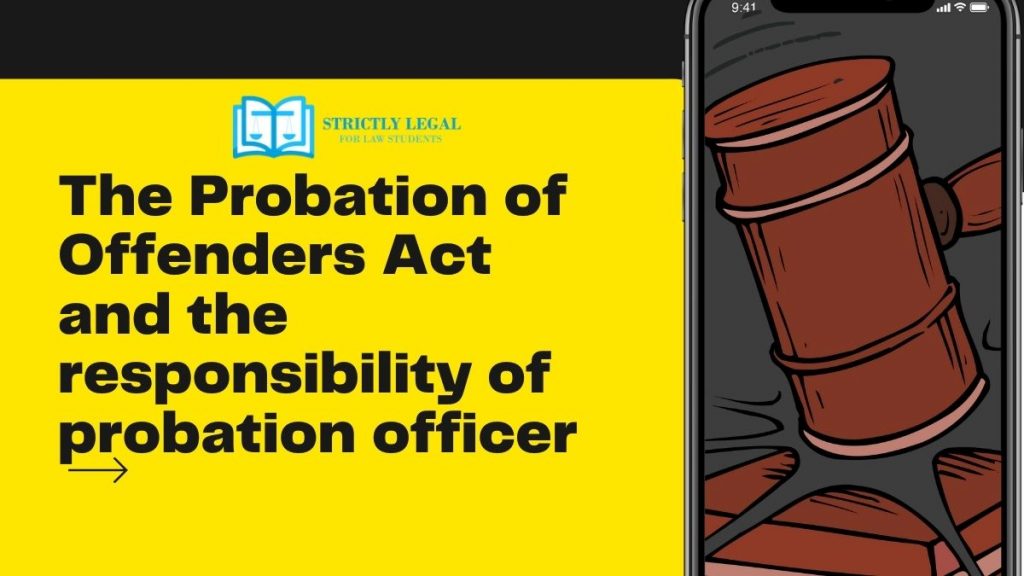The Probation of offenders Act of 1958 is based on the concept that young offenders should be prevented via counselling and rehabilitation rather than being placed in jail like normal offenders. The probation officer focuses on the offender’s worry or goal, attempts to resolve it, and strives to make the offender a productive member of the community. The probation officer is a crucial or essential function within the criminal justice system. He is at the forefront of prisoner rehabilitation, assisting convicts in confessing and rehabilitating them as good citizens of society.
Table of Contents
What is a Probation Officer?
A probation officer is a court officer who interacts with persons who have been sentenced to supervised probation on a regular basis. In general, these persons are perpetrators and low-level criminals. The vast majority of those sentenced to probation are first-time offenders. Placing anybody on probation is a means for the court to keep criminals out of prison. Many people on probation live in our communities, stay at home, work or participate in an educational programme, and raise their children. The goal of the judicial system is for a person on probation to be a responsible member of society while maintaining touch with family and community support.
Once on probation, a person may be forced to undergo a drug or domestic violence examination to evaluate whether treatment is required. Furthermore, persons may be required to participate in tracking sobriety by taking breathalyzer or urine tests. Another common prerequisite is for an individual to continue his or her education and/or employment.
Responsibilities of Probation Officer
The responsibilities of a probation officer include visiting their client on a monthly or even weekly basis. The probation officer may select the level of supervision that a person requires based on an evaluation of risk/needs (minimum, medium or maximum).
It aids in determining how much support is required. Evaluations look at how a person interacts with others, often known as their community relations. The evaluation also determines the likelihood that another individual will conduct more crimes.
A report form must be completed each time a probation client visits his or her probation officer. Unemployment, job gains, and divorce all have an impact on people’s lives. Meeting with a client helps the probation officer to determine where further assistance is needed for the client to succeed.
Duties of Probation Officer
According to Section 14 of the Offenders Probation Act of 1958, a probation officer is supposed to undertake the following duties, subject to any terms or limits that may be imposed:
- Investigate any individual accused of an offense’s circumstances or home environment with the goal, in line with any Court instruction, to assist the Court in determining and reporting the most suitably advised approach to his dealing with it;
- Supervising probationers and other people under his supervision and, if required, locating suitable jobs;
- Counseling and assisting victims in the payment of fines or fees by the Court;
- Advice and assistance to people released under Section 4 in such situations and manner as may be required; Perform any other tasks that may be prescribed.
- According to Section 14 of the Act, a probation agent’s primary responsibilities include investigation, monitoring and direction, counselling, and professional control of criminal probation. As an inspiring, guiding and supporting probationer, this probation officer facilitates the rehabilitation of the criminal as a law-abiding member of society.
Analysis and monitoring of accused
A comprehensive study of the delinquent’s life history and background history is required to acquire information about his faults or successes. If the criminal does not respond favourably to the reform measures, a proper investigation would necessitate more restrictions on the criminal’s rights. To collect as much information about his antecedents as feasible, the probationer must be addressed psychologically, with the consequence that information is gathered that allows the offender’s prospects of reformation during the probationary procedure to be assessed. Monitoring is primarily a police duty, therefore advising and supporting the research officer would be quite beneficial.
Supervision and counselling of accused
Continuous supervision of the probationer’s work is neither essential nor possible. Probation supervision may thus only be carried out through field trips and sporadic interactions. The Probation Officer will thoroughly comprehend and prescribe actions to overcome concerns that may impede the offender’s re-adjustment in society. He must actively assist the probationer in his recovery journey. The probationer is not constantly pressed or regulated.
According to Sections 14(b) and 18, the probation officer is in charge of supervising the probationer. The probationers who have been given or granted a check by the judge, on the other hand, have various characteristics. Both on a personal and legal level. When a court sentences an offender, it must ensure that the criminal also has the right to rehabilitation and that he or she is treated in accordance with regular human beings. Supervision is, therefore, one of the strategies that can cure and rehabilitate the offender under the supervision of the probation officer and protect society against the offender.
Simultaneously, the trial officer is responsible for shaping the offender’s character. As a result, there are two elements to supervision.
- The testing person must follow the court’s instructions. If the probationer breaches the terms of the probation, the check agent is required to notify the court. The trial officer must strike a balance between the offender’s rehabilitation and the safety of society. In this sense, he is doing double duty. If the probationer’s behaviors do not improve, he will be forced to serve as a societal guardian.
- Second, the trial officer must accept the probationer as he is, flaws and all. He must differentiate between situations that require minimal assistance and attention, those that react to guidance and counsel, and those that demand considerable attention but do not respond to his therapy.
During the probationary term, the probation officer must build a connection with the offender and instil confidence in him in the offender’s mind. He must also create and instil trust in the offender in his ability to choose his own path. The probation officer must stick by him and give him with suitable direction, ideas, and information, allowing him to cooperate with the probation officer in carrying out rehabilitation programmes.
Probation is an alternative punishment in which criminals selected by probation officials are permitted to serve a criminal sentence in the community.
Link to the Court
Another important role of the probation officer is to serve as a liaison between the probation and the Court, since the primary responsibility of the probationer under his supervision is to defend the interest. The court may order that the probation order be modified or that the probationary bond be exercised. When he determines that the probationer’s progress in adjusting to ordinary life in society is satisfactory.
Pre-sentence report of the probation officer
According to Section 7 of the Probation of Offenders Act, 1958, the trial officer is expected to produce a pre-sentence report with particular details of the prisoner asked to be released by the Court on probation. Based on this report, the court makes a decision and orders the defendant’s sentence to be commuted to probation. The trial officer’s pre-sentence report must contain accurate and true information regarding the offender’s personality, temperament, family and educational history, employment statistics, general conditions, and historical precedents.
The two most crucial prerequisites of a pre-sentence statement to give testimony to the offender’s background and behaviour are impartiality and objectivity. One of the major responsibilities of a probation agent is to provide a disciplinary report on the offender as directed by the Court. It should include all of the offender’s facts as well as an evaluative overview of the offender’s case.
One of the primary duties given to a PO under Section 14 (a) of the Act is the production of a pre-sentence report for direction by a Court on whether or not to award the benefit of probation. In accordance with Section 14(a) of the Act, the PO shall present pertinent facts, information in the report as required by the Court, after inquiries into the character of a criminal, his social conditions, financial and other family circumstances.
A statement of facts should be used to outline the case. PO’s case review assists the court in determining the best approach to deal with the offender once it has been found guilty.
If presented to the Court one day before its decision, the report shall be considered as ‘confidential’ and handed to the Court on the date indicated therein; it shall be enclosed in a sealed cover.
If the probation officer thinks that the probationer has matured sufficiently that additional monitoring is no longer necessary, he will recommend bond release in conjunction with the district probation officer.
Decision making
While making a decision on a probationer under his supervision, the probation officer should keep in mind that his judgments are critical not only for the offender but also for the safety of the community.
Probationer rehability and after care
In order to avoid resorting to violence, the probationary officer must assist with social rehabilitation. The probation officer will attempt to secure the probationer for this goal by doing the following:
Training facilities, career opportunities, any financial assistance required, and contacts and groups such as Boy Scouts and Girl Guides, youth programmes and civic initiatives for normal citizens and co-organizations.
The probation officer will maintain contact with discharged probationers in order to monitor progress in rehabilitating discharged probationers during such periods as may be prescribed by the Chief Probation Superintendent and to submit a follow-up report to the district probation officer and the Chief Probation Superintendent. Aftercare schemes and organisations such as Nav Jeevan Mandals, District Probation, and After Care Association would participate in the Probation Officer where suitable.
Appointment of Probation Officer
The following is stated in Section 13 of the Probation of Offenders Act about the appointment of a Probation Officer:
A person designated or recognised as a probation officer by the state government.
A person for whom a corporation recognised by the State Government has made provision for this purpose.
Any other person who, in the opinion of a court, is qualified to function as a probation officer in an unusual instance given the specific circumstances of the case.
Role of Probation Officer
Probation is the most significant or successful therapeutic technique. Without the help of the police, the probation officer cannot operate as a supervisor. It is noteworthy in terms of the police’s role. The trial officer and the police are two State institutions with substantially similar purposes. The entire outdoor rehab plan will fail since the motivations and goals are incompatible, as it is apparent that police will want to help probation staff.
The police have also played an important part in the rehabilitation and socialisation of juvenile criminals in institutions. When a person is freed from a domestic institution, it is assumed that the public does not accept him. Society would accept him; otherwise, he would engage in anti-social behaviour and repeat offences. In this regard, it is the police officer’s responsibility to reintegrate such individuals into society while also ensuring that other agencies, such as panchayats, are aware of their responsibility to assist him in socialising and carrying out his regular social job.
Conclusion
The Probation of Offenders Act of 1958 is extremely useful, especially in the current environment of prison reform, of a prison sentence that no longer recognises the jail term as the only course of treatment to protect society’s safety, is of significant importance to the judiciary and probation services. Probation and the notion of reform penalty, as alternative punishment measures, can only be implemented with the collaboration of the judiciary and the administration.
This will assist a nation like India, where jails are always overcrowded and human rights violations occur on a daily basis, hardening a person’s internality. Probation is a confirmation of the human being within each of us, and it should be prioritised. The rehabilitation and recovery process must be organised in accordance with contemporary societal structures in order to achieve the ultimate goal of returning these criminals to an ordered community. It is critical that the different criminal justice system groups work together to make probation a successful means of noncustodial treatment in all appropriate instances where the notion of restorative justice must be enforced.
FAQ
Probation officials supervise persons who have been sentenced, helping and advising them. Probation officials deal with condemned individuals, ensuring that they attend appointments and group programmes. Other typical responsibilities include: providing advice and information to offenders.
Probation in India is now largely at the initiative of the states. Instead, a centralised probation policy must be developed. The goal of the criminal justice system is to rehabilitate the offender while also ensuring the society’s and its people’s security by taking action against the offender.

Passionate about using the law to make a difference in people’s lives. An Advocate by profession.




